Laughter in the Dark (film)
Laughter in the Dark (French: La Chambre obscure) is a 1969 French-British romantic drama film directed by Tony Richardson and starring Nicol Williamson and Anna Karina.[2] It was based on the novel of the same name by Vladimir Nabokov.
| Laughter in the Dark | |
|---|---|
 Film poster | |
| Directed by | Tony Richardson |
| Screenplay by | Edward Bond |
| Based on | Laughter in the Dark by Vladimir Nabokov |
| Produced by | Neil Hartley |
| Starring | |
| Cinematography | Dick Bush |
| Edited by | Charles Rees |
| Music by | Raymond Leppard |
Production company | |
| Distributed by | United Artists (UK) |
Release date |
|
Running time | 104 minutes |
| Countries |
|
| Language | English |
| Box office | $780,000[1] |
Plot
For the film, the story's setting was changed from 1930s Berlin to the Swinging London of the 1960s.
A wealthy married 40-year-old art critic called Sir Edward More (Nicol Williamson) falls in love with a sixteen-year-old girl called Margot (Anna Karina).
However, she later cheats on him with another man (Jean-Claude Drouot) which eventually leads to him losing his eyesight while they argue in his car when he finds out about it and crash by avoiding oncoming cyclists. She continues with the affair but as Edward is now blind, she can have it right in front of him.
Eventually, he finds out about the still ongoing affair and confronts her in the cellar with a gun. But he fatally shoots himself with it by stumbling on the stairs in pursuit of her; and she then runs off while his dead body lies on the floor.
Cast
- Nicol Williamson as Sir Edward More
- Anna Karina as Margot
- Jean-Claude Drouot as Herve Tourace
- Peter Bowles as Paul
- Siân Phillips as Lady Elizabeth More
- Sebastian Breaks as Brian
- Kate O'Toole as Amelia More
- Edward Gardner as Driver
- Sheila Burrell as Miss Porly
- Willoughby Goddard as Colonel
- Basil Dignam as Dealer
- Philippa Urquhart as Philippa
Production
Casting
Nicol Williamson was brought in as a very late replacement for Richard Burton, who had already shot several scenes. The director, Tony Richardson, found Burton's lack of punctuality intolerable.[3][4]
Release
The film drew respectable reviews, but for reasons that are unclear, it was subsequently removed from distribution. The film has only been shown twice on British television, (in 1974 and 1981 on BBC2), and has not been released on any home video format.
Cancelled remake
Laszlo Papas was slated to direct a 1986 remake of the film which would have starred Mick Jagger as Axel Rex and Rebecca De Mornay as the young seductress; De Mornay was replaced by Maryam d'Abo after disagreements with the director, but ultimately the project went nowhere and the film was never made.[5]
References
- Tino Balio, United Artists: The Company That Changed the Film Industry, University of Wisconsin Press, 1987 p. 246
- Weiler, A. H. (2012). "NY Times.com: Laughter in the Dark". Movies & TV Dept. The New York Times. Baseline & All Movie Guide. Archived from the original on 11 May 2012. Retrieved 30 January 2010.
- Walker p.298-299
- Richardson, pp. 213-5. Richardson had directed Williamson in A Midsummer Night's Dream on stage and was planning to cast him as Hamlet. A famously turbulent and unpredictable actor himself, Richardson obviously saw him as a better bet than Burton. To recruit him in a hurry, Richardson sent a search party to comb the bars and bistros of the Cote d'Azur.
- Colapinto, John (2 January 2015). "Nabokov and the Movies". The New Yorker. Retrieved 5 January 2015.
Bibliography
- Walker, Alexander (1997). Elizabeth: The Life of Elizabeth Taylor. Grove Press. ISBN 978-0802137692.
- Richardson, Tony (1993). Long Distance Runner - A memoir. London: Faber & Faber. ISBN 0-571-16852-3.